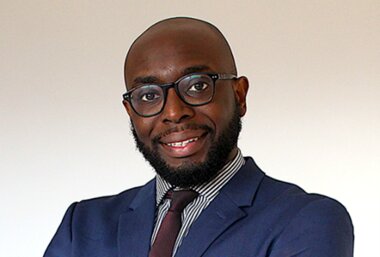10 May 2023
Daryl Hagan introduces a soon-to-be launched trial designed to answer questions around stem cell transplant treatments for the disease.
Can you introduce your role within King’s Health Partners?
I am a Senior Trial Manager at King’s Clinical Trials Unit (KCTU). KCTU is a UKCRC accredited trials unit that delivers high quality clinical trials ensuring excellence in the design, conduct, analysis and reporting of research, for the benefit of patients and society.
KCTU has a portfolio of approximately 120 on-going trials and works closely with King’s Health Partners on many projects. In my role, I am responsible for coordinating clinical trials on the KCTU portfolio, as well supervising junior Trial Managers to ensure trials are delivered to time and to budget.
What can you tell us about sickle cell disease? What are the main symptoms that patients experience?
Sickle cell disease (SCD) is one of the most common serious inherited conditions worldwide. It is a disorder in which red blood cells become sickle shaped in conditions of stress. The sickle shape is unable to pass through blood vessels easily, resulting in a blockage. Patients with severe SCD may have many complications of their condition including severe episodes of pain requiring frequent hospital admissions (sickle crisis), chronic pain, stroke, chest problems, increased risk of infection, impairment of brain function, kidney failure, and severe tiredness. Despite advances in care in recent years, SCD is still associated with shortened life expectancy and early death. In addition, quality of life for those with severe SCD is affected with many patients suffering impacts on self-esteem, relationships, education and employment.
Who is most likely to be affected by sickle cell disease?
Sickle cell disease mostly affects those from African or Afro-Caribbean backgrounds. Approximately 15,000 people in the UK have sickle cell.
What are the aims of the REDRESS study?
Standard treatment for sickle cell is limited, with regular blood transfusions and a drug called hydroxycarbamide the only options available. These treatment options do not offer cure and many patients will experience side effects of this treatment. Stem cell transplant (SCT) is a procedure where healthy stem cells from a matched donor are given to a person with a blood disease. These stem cells can produce healthy red blood cells and replace abnormal sickle cells.
Researchers have developed transplant protocols showing that SCT can be carried out safely in adults with high cure rates when receiving SCT from a 100% matched sibling. However, many patients do not have full matched donor and this option is not available to them. Patients can also receive SCT from relatives who are a 50% match, for example, from a sibling with whom they share one parent.
This known as haploidentical (haplo) SCT. Initially there were concerns that haplo SCT would not work due to high rejection rates, however recent research and new protocols mean it is now possible for haplo SCT to be done without rejection. The NHS has agreed funding for fully matched SCT, but further evidence is required for haplo SCT. We are conducting a clinical trial of haplo SCT compared to standard care.
The aims of this trial are to:
- Assess whether haplo stem cell transplant is safe and clinically effective.
- Assess whether the cost of haplo SCT to the NHS is less than the current treatments.
In summary, haplo SCT this is not funded for adults in the UK at present due to lack of robust research. This study will enable us to answer outstanding questions to then offer haplo SCT as a treatment option with the possibility of a cure for people living with sickle cell.
What are the next steps and how can people find out more?
We are excited to hold our launch event for the REDRESS study on Saturday 20 May at Guy’s Hospital in London. More information on the event can be found here.
To find out more on REDRESS, people can visit the website at www.redresstrial.co.uk or contact the study team via email at redress@kcl.ac.uk. You can also follow the study on Twitter @redress_study for live updates.
All potential participants must be referred into the trial by their doctor. However, if you are interested in participating in this trial or if you are clinician/academic interested in collaborating on the project, then please contact the team in the first instance.
King’s Health Partners Haematology brings together our strengths in clinical service, research, and education to deliver exceptional outcomes for haematology patients.





